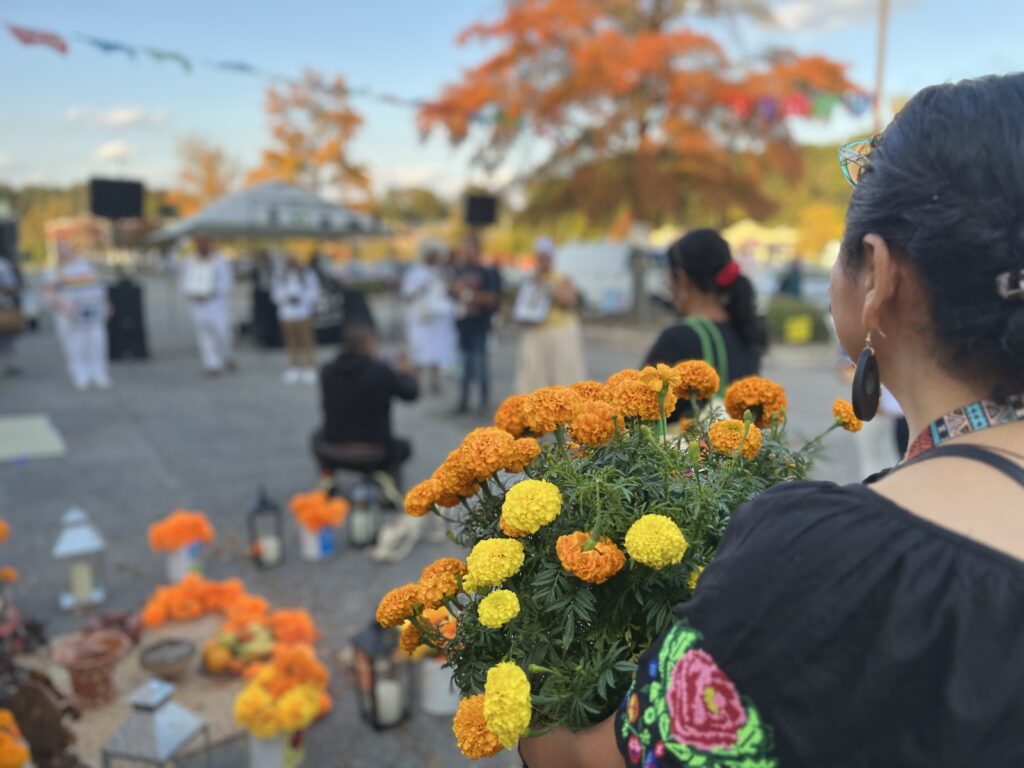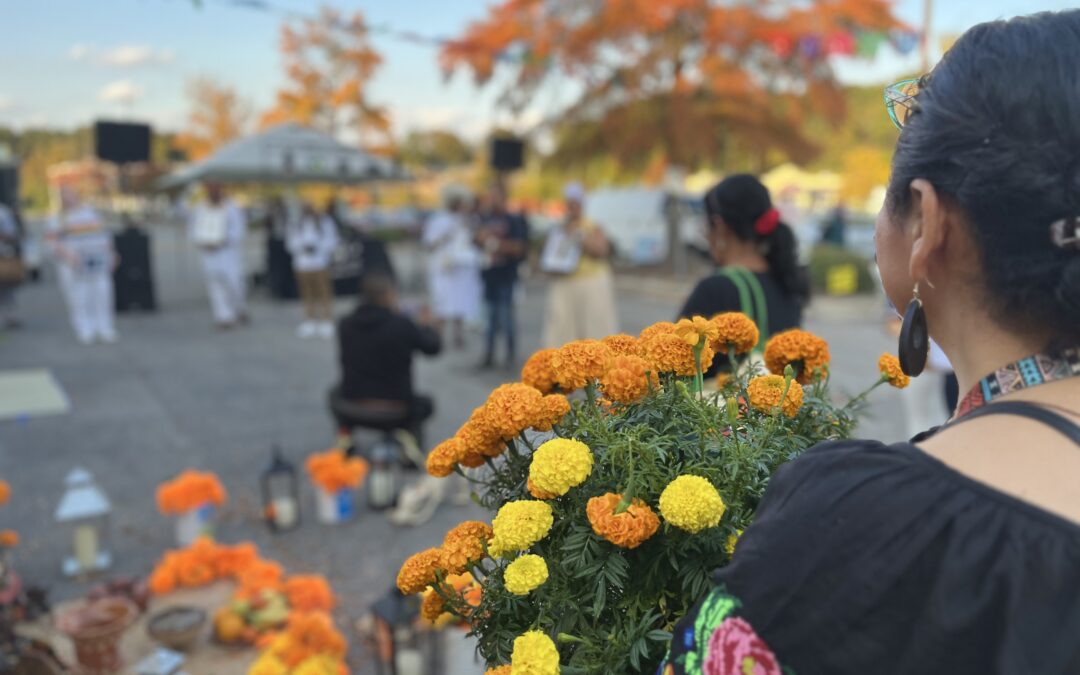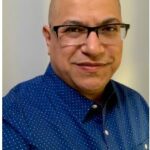 Dear Friend,
Dear Friend,
If you’ve ever been in my office, you know that I have sticky notes of new Spanish (and some English!) words that I learn from my colleagues and clients. For instance, did you know that El Futuro means “The Future”? (You’d be surprised how many people ask me!)
Recently, one word has stuck with me.
During one of our substance use treatment sessions, I heard a young father share his testimony. He originally immigrated here to care for his aging parents, but the stressors of a new lifestyle led him to abuse alcohol. He said his addiction stole his life and he lost the chance to see his children grow. Now, however, sobriety gives him a new meaning for life: la convivencia.
Convivencia literally translates to living together, but a more robust translation would be “to live life together.” He learned that he could replace his drive to abuse substances with playing on the soccer team or joking with his coworkers or going to the lake with his family or having a dance party with his children. He learned the healing value of living life together.
In my 20 years with El Futuro, this is one of the most important lessons I can share: we belong to each other.
In fact, many of the tools used by El Futuro’s therapists, psychiatrists, peer support community health workers, and trainers are rooted in the healing properties of belonging to one another such as Family Systems Theory, Neurosocial Interdependence, and Paul Farmer’s Theory of Accompaniment, to name a few.
For the young father who shared his testimony, separation was all around him: the language his coworkers spoke, the behaviors his children brought home from school, the disapproving glare from an unfriendly neighbor, the long-distance phone calls with his family, and his own numbing sense of self-alienation through substance abuse.
However, his counselors and therapists helped him to see that he had strategies and strengths that he brought from his home country and his upbringing that could help buffer his mental health. Integrative mental health for this young father and hard-working employee meant restoring those connections and sources of support through conviviencia.
As I reflect on 20 years of El Futuro’s work, what I see is people helping people to take the next step forward, even in times of uncertainty. I see moms who are no longer paralyzed by post-traumatic stress and who are able to take good care of their kids. I see students who are able to feel calm and do well on their tests in order to be the next scholarship recipient. I see family after family overcoming fear and anxiety to do great things in our communities.
I see a community that belongs to one another.
One way that this community care is especially evident is in the 20 Latino-owned businesses that are committing their support to El Futuro here at year’s end.
If you are reading this letter, it is because at some point you have belonged to El Futuro and/or vice versa. Thank you!
And here, at the end of the year, I want to invite you to invest in El Futuro with your donation of support before December 31. We served 2,800 familias last year – more than ever before! And with your support, we will continue to serve even more in 2025.
By contributing to El Futuro, you help us to create community-owned, innovative, and effective responses that address our community’s needs. Things like our therapeutic garden, summer camps for kids, drunk driving simulations for teenagers, group programs for people who have experienced domestic violence, and so much more.
Thank you for being a part of El Futuro!
With thanks and all the brightest holiday wishes,
Luke Smith, MD
Executive Director and Psychiatrist


 Alvely Alcántara, LCSW
Alvely Alcántara, LCSW Rossy C. Garcia, MEd
Rossy C. Garcia, MEd  Katy Sims, MD
Katy Sims, MD  Everardo Aviles, LCSW, LCAS (Eve)
Everardo Aviles, LCSW, LCAS (Eve) As a medical anthropologist and social work researcher, Dr. Gulbas’ research embodies interdisciplinarity through the integration of applied theories of health and human development with qualitative and ethnographic methodologies. Her work seeks to understand how people—children, families, and providers—navigate complex sociocultural landscapes in the pursuit of mental health. Most of her work, to date, focuses attention on developing more robust interpretations of suicide risk. With funding from the National Institutes of Mental Health, this body of research has contributed to advancements in theoretical and empirical knowledge of the broader contexts within which youth suicide risk is situated.
As a medical anthropologist and social work researcher, Dr. Gulbas’ research embodies interdisciplinarity through the integration of applied theories of health and human development with qualitative and ethnographic methodologies. Her work seeks to understand how people—children, families, and providers—navigate complex sociocultural landscapes in the pursuit of mental health. Most of her work, to date, focuses attention on developing more robust interpretations of suicide risk. With funding from the National Institutes of Mental Health, this body of research has contributed to advancements in theoretical and empirical knowledge of the broader contexts within which youth suicide risk is situated.  R. Gabriela Barajas-Gonzalez is a developmental psychologist and an assistant professor of Population Health at NYU Grossman School of Medicine. Dr. Barajas-Gonzalez is the principal investigator of a study that examines the impact of immigration-related threat and stress on school communities. She earned a PhD in developmental psychology from Columbia University and hold a BA in human biology from Stanford University. Dr. Barajas-Gonzalez is the daughter of Mexican immigrants and a first gen college student.
R. Gabriela Barajas-Gonzalez is a developmental psychologist and an assistant professor of Population Health at NYU Grossman School of Medicine. Dr. Barajas-Gonzalez is the principal investigator of a study that examines the impact of immigration-related threat and stress on school communities. She earned a PhD in developmental psychology from Columbia University and hold a BA in human biology from Stanford University. Dr. Barajas-Gonzalez is the daughter of Mexican immigrants and a first gen college student. Dr. Parra-Cardona is an Associate Professor in the Steve Hicks School of Social Work (SHSSW) at the University of Texas at Austin. At the SHSSW, he serves as Coordinator for Mexico and Latin American initiatives. He also serves as Area Director for Research at the UT Austin Latino Research Institute. Dr. Parra-Cardona’s program of research is focused on the cultural adaptation of evidence-based parenting interventions for low-income Latinx populations in the US and Latin America.
Dr. Parra-Cardona is an Associate Professor in the Steve Hicks School of Social Work (SHSSW) at the University of Texas at Austin. At the SHSSW, he serves as Coordinator for Mexico and Latin American initiatives. He also serves as Area Director for Research at the UT Austin Latino Research Institute. Dr. Parra-Cardona’s program of research is focused on the cultural adaptation of evidence-based parenting interventions for low-income Latinx populations in the US and Latin America. Bianka Reese, PhD, MSPH is a research scientist and program evaluator specializing in adolescent and young adult sexual and reproductive health. Her previous research in the experiences of Latinx LGBTQ+ youth stems from her work as the Research and Evaluation Manager at SHIFT NC (Sexual Initiatives For Teens), where she led largescale evaluations of multilevel, community-based sexual health promotion initiatives and research projects aimed at elevating the voices of diverse youth in North Carolina. Dr. Reese is currently the Senior Research Strategist at Creative Research Solutions, LLC, an award-winning national evaluation, research, and assessment firm.
Bianka Reese, PhD, MSPH is a research scientist and program evaluator specializing in adolescent and young adult sexual and reproductive health. Her previous research in the experiences of Latinx LGBTQ+ youth stems from her work as the Research and Evaluation Manager at SHIFT NC (Sexual Initiatives For Teens), where she led largescale evaluations of multilevel, community-based sexual health promotion initiatives and research projects aimed at elevating the voices of diverse youth in North Carolina. Dr. Reese is currently the Senior Research Strategist at Creative Research Solutions, LLC, an award-winning national evaluation, research, and assessment firm. Tania Connaughton-Espino, MPH is an independent researcher focused on adolescent and young adult sexual and reproductive health. Her interest in the experiences of Latinx LGBTQ+ youth stems from her previous work with SHIFT NC (Sexual Initiatives For Teens), where she led the training and evaluation department, conducted capacity-building workshops for youth serving professionals including on the topic of how to be more affirming of LGBTQ youth, and from her extensive experience working with the Latinx population in NC.
Tania Connaughton-Espino, MPH is an independent researcher focused on adolescent and young adult sexual and reproductive health. Her interest in the experiences of Latinx LGBTQ+ youth stems from her previous work with SHIFT NC (Sexual Initiatives For Teens), where she led the training and evaluation department, conducted capacity-building workshops for youth serving professionals including on the topic of how to be more affirming of LGBTQ youth, and from her extensive experience working with the Latinx population in NC. Maru Gonzalez, EdD is an Assistant Professor and Youth Development Specialist in the Department of Agricultural and Human Sciences at North Carolina State University. Her areas of inquiry include youth development with a focus on activism, social justice, and the experiences of LGBTQ+ young people across familial, school, and community contexts.
Maru Gonzalez, EdD is an Assistant Professor and Youth Development Specialist in the Department of Agricultural and Human Sciences at North Carolina State University. Her areas of inquiry include youth development with a focus on activism, social justice, and the experiences of LGBTQ+ young people across familial, school, and community contexts.  Nayeli Y. Chavez-Dueñas, PhD
Nayeli Y. Chavez-Dueñas, PhD Hector Y. Adames, PsyD
Hector Y. Adames, PsyD